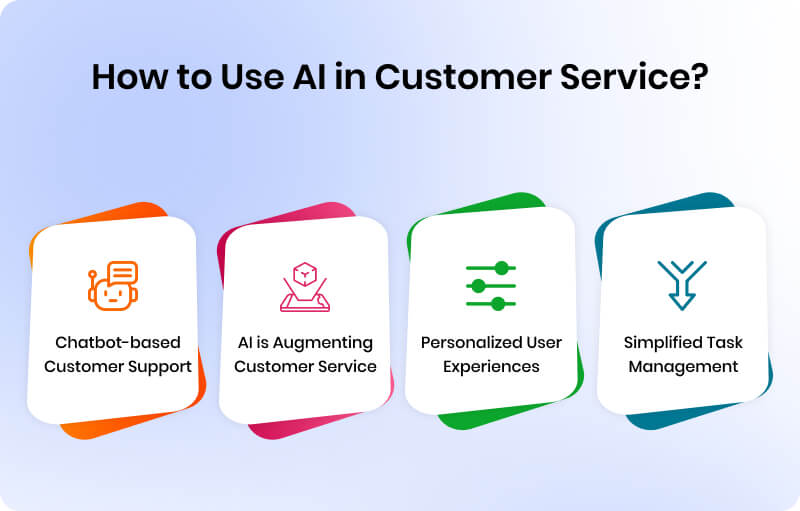The landscape of customer service has undergone a dramatic transformation since the onset of the COVID-19 pandemic. In the aftermath of widespread disruptions, customer expectations have reached unprecedented levels, with a staggering 72% of consumers expressing loyalty to companies that provide faster service. The challenges of meeting these expectations have, however, resulted in a delicate balancing act for service agents, with 78% finding it difficult to navigate the trade-off between speed and quality. This pressure-cooker environment has led to a turnover rate of 19% in service organizations, highlighting the urgency for innovative solutions.
Amidst this backdrop, the convergence of predictive and generative Artificial Intelligence (AI) has emerged as a powerful force in customer service. In this article, we will explore the role of AI, and its benefits, and delve into the specific realm of generative AI, shedding light on its potential impact on customer experiences.
The Evolution of AI in Customer Service

AI in customer service encompasses a variety of applications, with AI-powered chatbots being one of the most prominent examples. These chatbots, seamlessly integrated across channels, offer instant responses to customer queries, going beyond mere information provision. They greet customers, guide them through processes, and even initiate field services, thus streamlining the customer service experience. The contrast is stark when comparing the traditional scenario of waiting 30 minutes for an agent’s response to the instantaneous, personalized assistance offered by customer service AI.
The prevalence of AI in customer service is evident, as 45% of service decision-makers reported using AI, marking an 88% increase since 2020. The widespread adoption of these technologies highlights the growing recognition of their potential to enhance customer service.
Benefits of AI in Customer Service

- Higher Productivity: AI-based conversational assistants have been found to increase support agents’ productivity by 14%, allowing them to handle tasks more efficiently.
- Improved Efficiency: AI eliminates manual processes, reducing errors associated with tasks such as navigating multiple systems, searching for knowledge articles, and typing responses. Service professionals believe that AI can make them 63% faster in serving customers.
- Personalized Service Interaction: Through real-time analysis of customer data, AI ensures a personalized interaction, populating essential information like name, location, and account type during conversations. This level of personalization extends to field service, where technicians can access critical information before arriving at a customer’s location.
- Reduced Burnout and Improved Morale: AI’s ability to automate repetitive tasks allows human agents to focus on creative problem-solving and complex critical thinking, reducing burnout by 79%.
- Proactive Service Experience: AI leverages customer data to surface next-best actions, ensuring ongoing engagement even after a service interaction. This includes reminders for subscription renewals, maintenance appointments, or available product upgrades, contributing to a proactive service experience.
Examples of AI in Customer Service

- Content Generation: Generative AI analyzes customer messages to generate human-like replies, improving response times and customer satisfaction by drawing from CRM data and knowledge.
- Chatbots: AI-powered chatbots handle basic inquiries, provide instant responses, and assist with tasks like order tracking, product recommendations, and troubleshooting, enhancing accessibility with 24/7 availability.
- Natural Language Processing (NLP): NLP enables AI systems to understand and interpret human language, facilitating sentiment analysis, identifying customer needs, and providing relevant responses.
- Sentiment Analysis: AI-powered sentiment analysis tools monitor and analyze customer feedback, reviews, and social media interactions to gauge customer sentiment, enabling personalized responses.
- Recommendation Systems: AI-driven recommendation systems analyze customer behavior to provide personalized product or content recommendations, enhancing cross-selling and upselling opportunities.
- Predictive Analytics: AI-based predictive analytics anticipates customer needs, behavior patterns, and potential issues, allowing proactive addressing of concerns and personalized interactions.
- Self-Service Solutions: AI-powered self-service solutions use natural language processing to understand queries and provide relevant information, empowering customers and agents to find answers quickly.
- Intelligent Routing: AI-based intelligent routing systems analyze incoming inquiries, directing them to the most knowledgeable service representative, ensuring efficient problem resolution.
Implementing AI in Customer Service: Considerations

Despite the evident benefits of AI in customer service, organizations face challenges in adopting these technologies. Three key considerations are crucial when implementing AI:
- Impact on Workforce: The introduction of AI, especially generative AI, reveals a skill gap, with 66% of leaders acknowledging a lack of necessary team skills. Communicating the complementary role of AI and emphasizing the continued need for human skills is vital to overcoming apprehension.
- Trust and Reliability Issues: Concerns about the accuracy of AI systems, especially when handling complex queries or sensitive information, pose challenges. Building trust by grounding AI in up-to-date CRM data and knowledge bases is essential.
- Investment and Implementation: Implementing AI may require significant investments in technology infrastructure and training. Small businesses with limited resources may find it challenging to fund AI implementations or lack the technical expertise for deployment and maintenance.
The Future of AI in Customer Service
As AI and customer service continues to evolve, generative AI is expected to move beyond the contact center and extend into the field. This shift will empower frontline field service teams with comprehensive customer, asset, and service history data, enabling them to offload mundane tasks through automated work summaries and knowledge articles.
Getting Started with AI in Customer Service
The journey into AI in customer service begins with understanding its capabilities. Exploring how generative AI can personalize customer experiences, boost agent efficiency, and contribute to overall service improvement is essential. Organizations can leverage AI to generate personalized replies, create work summaries, share knowledge efficiently, and enhance search capabilities for quicker answers.
Selecting the Right Customer Service Software
Choosing the best customer service software is a critical step in implementing AI effectively. Considerations such as ease of use, scalability, support for remote work, collaboration features, reporting and analytics capabilities, and automation functionalities are paramount. Conducting thorough research, reading reviews, engaging with power users, and requesting demos are essential steps in making an informed decision.
Conclusion
AI in customer service has emerged as a transformative force, addressing the challenges posed by elevated customer expectations and the complexities of service delivery. Generative AI, in particular, holds the promise of revolutionizing customer interactions by automating routine tasks, personalizing responses, and enhancing overall efficiency. As organizations navigate the evolving landscape of customer service, embracing AI becomes not just a strategic choice but a necessity to stay competitive and deliver unparalleled customer experiences.










